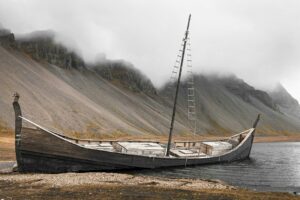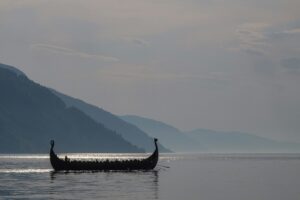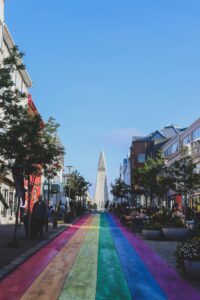Introduction
If you think Valentine’s Day is the ultimate celebration of love and appreciation, allow Iceland to politely (and frostily) disagree. Enter Bóndadagur, Iceland’s very own Husband’s Day or Farmer’s Day – a time-honoured tradition where men are celebrated with more than just a pair of new socks.
Held on the first day of the old Norse month of Þorri (typically in late January), Bóndadagur is the perfect excuse to shower the men in your life with affection, food, and perhaps a few Icelandic craft beers (I’m personally hoping for the latter!)
But Bóndadagur is more than just a day of pampering. It’s steeped in Viking history, quirky rituals, and a deep appreciation for resilience – a necessity when surviving Iceland’s notoriously brutal winters.
This blog will take you on a journey through the origins, customs, and modern celebrations of Bóndadagur, with a few tips on how to join in the fun. Spoiler alert: there will be fermented shark.
The Origins of Bóndadagur

Norse Pagan Roots and Viking Traditions
Bóndadagur finds its origins in Iceland’s Viking past, where Norse pagan traditions dictated much of daily life and seasonal celebrations.
The harsh Icelandic climate demanded resilience, preparation, and a deep connection with nature. The Norse calendar divided the year into two main seasons – summer and winter – with the month of Þorri marking the heart of winter. This was a period when early Icelanders relied heavily on their household leaders to ensure their survival through brutal cold and darkness.
Norse mythology played a significant role in these early traditions.
The god Thor (Þór), known for his strength and protection of mankind, was widely worshipped during this time.
Festivals and rituals were held to honour Thor, hoping to secure his favour against winter’s hardships. The bóndi, or head of the household, led these rituals, symbolizing his responsibility to protect his family and maintain their well-being.
Connection to the Þorrablót Festival

Bóndadagur isn’t a stand-alone holiday – it kicks off the Þorrablót festival, a month-long midwinter celebration.
Historically, Þorrablót was a feast to honour Þorri, the personification of winter.
The bóndi would lead the family in rituals to welcome Þorri into the home (symbolically, of course – no icy spirits actually entered the house). This act of welcoming winter was meant to show bravery and readiness to face the season’s hardships.
Þorrablót involved plenty of feasting on preserved foods, drinking, and toasting to good fortune.
Over time, as Christianity took root in Iceland, the sacrificial elements faded, but the spirit of the celebration remained.
In the 19th century, Þorrablót was revived as a cultural tradition, and Bóndadagur found its place as the festival’s official opening day.
The Meaning of Bóndi in Icelandic Culture
In Icelandic culture, the bóndi was more than just a farmer – he was the cornerstone of the family unit.
Managing the land, caring for livestock, and protecting the household were all part of the bóndi’s role. In a country where survival depended on resourcefulness and hard work, the bóndi’s contributions were invaluable.
Over time, the term bóndi evolved. Today, it generally refers to husbands and male partners, not just farmers.
Bóndadagur honours this role, recognising the modern bóndi’s dedication, whether he’s managing a sheep farm, navigating online grocery orders, or writing travel blogs (just saying). Either way, the spirit of leadership and care is celebrated.
Traditional Customs and Practices

Symbolic Rituals of Welcoming Winter
One of the quirkiest traditions of Bóndadagur involved the bóndi stepping outside into the freezing winter air wearing only a thin shirt (sometimes less) to symbolically welcome Þorri into the home.
Imagine greeting winter itself in your pyjamas. This brave (or foolish) act was seen as a gesture of hospitality and a way to demonstrate resilience in the face of Iceland’s punishing climate.
Though few practice this frosty ritual today, it perfectly captures the playful and hardy spirit of Icelanders.
It’s a reminder that even in the harshest seasons, there’s always room for humour – and perhaps a hot drink after stepping back inside.
Traditional Foods of Bóndadagur (Þorramatur)
No Icelandic celebration is complete without food, and Bóndadagur is no exception.
Traditional feasts feature Þorramatur, a collection of preserved Icelandic dishes that harken back to the days when food needed to last through long winters. This includes delicacies like fermented shark (hákarl), smoked lamb (hangikjöt), pickled ram’s testicles, and sheep’s head jelly (sviðasulta).
These traditional foods were born out of necessity.
Early Icelanders had to develop ways to preserve meat and fish to survive the harsh winter months.
Fermentation, smoking, and curing were essential preservation methods that allowed families to make the most of their limited resources.
Over time, these preservation techniques evolved into culinary traditions, turning necessity into cultural pride.
Today, enjoying Þorramatur is a way to honour the resilience and resourcefulness of Iceland’s ancestors.
Modern Bóndadagur feasts often balance these traditional dishes with more contemporary Icelandic cuisine, blending old and new flavours.
For visitors and locals alike, it’s an opportunity to taste history and embrace Iceland’s bold culinary heritage. Even those hesitant to try hákarl find themselves immersed in a celebration of Icelandic identity through food.
Historical Gifts and Acts of Honour

Traditionally, Bóndadagur wasn’t about extravagant gifts. Wives and families honoured the bóndi with simple but meaningful gestures like cooking his favourite meal or crafting handmade items.
Knitted woolen socks or a warm sweater were practical gifts that symbolised care and appreciation.
Beyond material gifts, acts of service were highly valued (and this was before ‘Love Languages’ were spoken about!)
A wife might relieve her husband of his daily chores for the day or surprise him with a well-deserved rest after months of hard work during the unforgiving winter. These thoughtful acts of appreciation held more value than lavish gifts because they emphasised care and gratitude over wealth.
Today, while modern celebrations may include bought gifts, the spirit of thoughtfulness continues.
Icelanders still value meaningful gestures over material items, preserving the essence of this tradition.
Modern-Day Celebrations
How Icelanders Celebrate Bóndadagur Today
Today, Bóndadagur is a festive and heartfelt occasion that blends traditional customs with modern interpretations.
Many families start the day by preparing a special breakfast or meal for the man of the house. Partners may surprise each other with thoughtful gifts or plan activities to enjoy together. Some families might stay in for a cozy evening, while others opt for a night out at a favourite restaurant.
Restaurants and cafes across Iceland often create special menus for Bóndadagur, offering everything from gourmet Icelandic dishes to modern twists on traditional foods.
Bakeries also join in on the celebration, crafting themed cakes and pastries. It’s a day for indulgence, appreciation, and togetherness.
While modern celebrations include commercial elements, the focus remains on quality time and sincere appreciation for the men in Icelandic families.
Popular Gifts and Gestures for Men

Gift-giving on Bóndadagur has evolved to include a variety of thoughtful and personalised options.
Popular gifts include hand-knit Icelandic wool sweaters (lopapeysa), craft beers from local breweries (spoiler: there is even one called Bóndi), adventure experiences like glacier hiking, or relaxing spa treatments.
The key to a great gift on Bóndadagur is thoughtfulness – it’s less about the price tag and more about the meaning behind the gesture.
For some, heartfelt gestures like a handwritten letter, a surprise home-cooked meal, or a spontaneous trip to a scenic spot hold more value than physical gifts.
These gestures reflect the heart of the day – an emphasis on appreciation and affection (which can often take a backseat when dealing with your kids moans!)
Influence of Commercialisation on the Holiday
Like many traditional holidays, Bóndadagur has seen a degree of commercialisation.
Retailers offer themed products, restaurants curate exclusive menus, and gift shops display items marketed specifically for this day.
While this commercialisation has added more ways to celebrate, it has also shifted some focus toward consumerism.
Despite this, most Icelanders prioritize heartfelt gestures over lavish spending. The commercialisation of Bóndadagur provides more opportunities to celebrate in creative ways, but the core of the day still focuses on gratitude, love, and appreciation.
Bóndadagur and Gender Roles

The Celebration of Husbands and Fathers
Bóndadagur has traditionally been a day to celebrate the bóndi – the male head of the household.
Historically, this meant honouring the hard-working farmers and providers who braved Iceland’s unforgiving winters to care for their families.
However, in modern Iceland, the definition of who we celebrate has broadened. Bóndadagur now recognises not only husbands but all men who contribute to family and community life. Fathers, brothers, sons, and male partners are equally honoured on this day.
This shift reflects Iceland’s progressive and inclusive society, where appreciation is shown for emotional support, caregiving, and other contributions beyond traditional gender roles.
Acts of kindness, gestures of love, and words of appreciation define how families celebrate.
Whether it’s through a homemade meal or a thoughtful gift, Bóndadagur serves as a meaningful opportunity to show gratitude for the men who support, nurture, and enrich our lives.
Comparison with Konudagur (Women’s Day)
Bóndadagur has a delightful counterpart: Konudagur, or Women’s Day, which is celebrated in February.
This pairing of holidays reflects Iceland’s cultural balance in recognising and appreciating both genders within relationships and families.
While Bóndadagur honours men, Konudagur is dedicated to celebrating women, reinforcing mutual respect and equality in Icelandic culture.
Both holidays encourage partners to express their love and appreciation through thoughtful gifts, acts of service, or quality time spent together.
This balance ensures that appreciation is shared equally, fostering a culture of gratitude.
Icelanders value these celebrations as moments to strengthen bonds, making both Bóndadagur and Konudagur integral to Iceland’s social fabric.
Evolving Gender Perspectives in Modern Iceland

Iceland is renowned for its progressive stance on gender equality, and Bóndadagur has evolved to reflect these values.
In today’s celebrations, gender roles are more fluid and inclusive. The day has moved beyond solely honouring traditional male roles to celebrating all men, regardless of their relationship status or societal role.
Same-sex couples, non-binary individuals, and diverse family structures now embrace the holiday, using it as a time to celebrate love and support in all forms.
This evolution highlights how Icelandic society has adapted its traditions to be more inclusive and reflective of modern values.
Bóndadagur today is a celebration of partnership, respect, and shared responsibility in relationships.
Cultural Significance of Bóndadagur
Preserving Icelandic Traditions
Bóndadagur is more than just a day to pamper the men in our lives – it’s a celebration deeply rooted in Iceland’s cultural history.
By participating in this tradition, Icelanders pay homage to the resilience and strength of their Viking ancestors. Traditional foods, rituals, and heartfelt gestures of appreciation connect modern celebrations with centuries-old customs.
Preserving traditions like Bóndadagur reinforces Icelandic cultural identity.
It offers a chance for families to pass down stories and practices, ensuring that younger generations understand and appreciate their heritage. Despite modern influences, the essence of Bóndadagur remains, symbolising endurance, gratitude, and unity.
Strengthening Family and Community Bonds

At its heart, Bóndadagur is about strengthening family and community bonds.
Whether it’s through sharing a traditional meal, exchanging thoughtful gifts, or simply spending time together, the holiday fosters closeness and appreciation. These shared experiences create lasting memories and reinforce the importance of supporting one another.
Beyond individual families, Bóndadagur also strengthens community ties.
Local businesses, restaurants, and cultural organisations often host events, encouraging community-wide participation. These collective celebrations contribute to Iceland’s reputation as a close-knit society where traditions continue to thrive.
How to Celebrate Bóndadagur as a Visitor
Experiencing Traditional Icelandic Foods
For visitors, Bóndadagur offers a unique opportunity to savour traditional Icelandic cuisine.
Many restaurants and local eateries feature special Þorramatur menus during the season. These dishes – fermented shark, smoked lamb, rye bread, and pickled delicacies – offer a taste of Iceland’s history and culture.
Participating in a traditional Icelandic feast allows visitors to connect with the past and gain a deeper appreciation for the resourcefulness of Iceland’s ancestors.
Adventurous eaters may even grow to love hákarl, while others can enjoy milder traditional dishes.
Participating in Local Events and Festivities
Visitors can immerse themselves in Icelandic culture by attending local events and festivities.
Towns and cities often host Þorrablót celebrations, complete with music, dancing, and storytelling. Joining these gatherings offers a wonderful chance to experience Icelandic hospitality and connect with locals.
Many hotels and tour companies also offer special Bóndadagur packages that include cultural tours, traditional meals, and even outdoor adventures.
Whether it’s enjoying a geothermal spa or attending a feast, there are countless ways for visitors to celebrate.
Thoughtful Gift Ideas for the Occasion

If you’re visiting Iceland during Bóndadagur, consider participating in the tradition of gift-giving. Thoughtful souvenirs like Icelandic wool products, handmade crafts, or local delicacies make meaningful presents. You might also surprise your travel companion with a personalised experience – like a Northern Lights tour or a cozy dinner.
Engaging in this tradition adds depth to your visit and allows you to participate in Icelandic customs in an authentic and memorable way.
Conclusion
Bóndadagur remains a vibrant part of Icelandic culture – a day rooted in tradition but alive with modern meaning. Whether through ancient customs or contemporary gestures, it’s a day for love, respect, and celebration.
As Iceland continues to evolve, so does Bóndadagur. Yet, at its heart, it remains a celebration of the resilience, love, and support that men provide within their families. From traditional feasts to thoughtful gifts, this holiday is a beautiful reminder to cherish and honour the people who enrich our lives.
For visitors, Bóndadagur offers a chance to experience the warmth of Icelandic hospitality and participate in a tradition that beautifully blends history and modern values. Whether you’re stepping into the cold to welcome Þorri or simply enjoying a quiet moment with loved ones, Bóndadagur invites everyone to celebrate resilience, love, and family.

